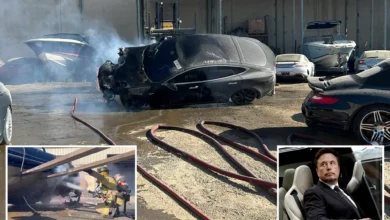Top 10 Best Electric Cars in India in 2022

Top 10 Electric Cars in India in 2022
While many people worldwide have already switched to environmentally friendly cars, Indians are beginning to see the promise and use of electric vehicles. Electric car sales increased by 20% in 2019-20. (source)
Automakers are producing new battery-powered vehicles almost every year due to this spike in demand.
If you’re on the market for the most excellent electric vehicles in India, you’ve arrived at the perfect spot. We’ve compiled a list of today’s and tomorrow’s most excellent electric car choices.
The foundation for charging electric cars
The choice of current electric cars is somewhat higher than in previous years, when Reva and Mahindra E20 were the most practical options, but not at this time, a realistic one for everyone.
The Delhi Government added a spic and span EV inclusion that gives a sponsorship based on battery limit, Rs. 5,000/kWh or as much as Rs. 30,000 for electric cars and as much as Rs. 1.5 lakh for all-electric cars, to increase the pay of ongoing electric cars within the countrywide capital. The inclusion also provides buying motivation for supporters who want to replace their old gasoline, diesel, CNG, or LPG (inward burning engine) car with a brand new electric car.
In India, the fate of electric cars is uncertain.
Electric engines are increasingly becoming more widely seen. They’re cleaners, and they’re also a lot of fun!
The extensive range of e-portability options accessible to India would benefit the country extensively. The manufacturing of e-engines and their associated additional materials is anticipated to increase delivery in India’s GDP to 25% by 2022 under the Make In India initiative.
Isn’t it even more exciting that the Indian people’s attitudes are also progressively changing, with many now planning to switch to EVs shortly? According to a recent poll, most Indian car purchasers will choose an electric vehicle by 2022. This is a significant design that can cause the EV segment to explode within the United States.
Experts in mediation and inclusion, without a doubt, have a critical role to play in promoting electric-powered versatility inside the United States. Indian authorities have effectively pushed EV selection, and two or three enterprises have been launched to create home capabilities across the complete EV value chain.
Apart from bolstering EV production capabilities, inexhaustible force aims are also being revisited, and numerous efforts are being taken to get closer to fantastic uncooked material reuse.
With the help of more than 30 technologies between 2018 and 2025, battery prices are anticipated to decline, making electric vehicles (EVs) more affordable over time. Aside from that, India’s experts have proposed a variety of tax breaks and benefits to encourage a growing number of people to consider electric vehicles.
Are unadulterated electric vehicles the best electric cars to search for in India in 2022? A few people strive to ditch petroleum and diesel-fueled engines in favour of unadulterated electric automobiles. Still, are they the best electric cars to look for in India in 2022?
We’ve compiled a list of the best apex EVs available in India. This will assist you in deciding which electric vehicles are suitable for you based on their charge, variety, and features.
1. Hyundai Kona Electric

The famous electric fuelled car from the well-known Korean firm is one of the good electric automobiles to look for in India right now. The current electric automobile is rising as one of the palatable purchase(s) in a commercial centre ready to recognise new adjustments and make advances toward electric cars inside the norm, with a price range of Rs.23 – 24 lakh (ex-display area).
That is to say, the fundamental aspect of the Kona electric fuelled is a total of the most execution and extravagance to the renters.
The brief energising may charge the car to an eighty by penny charge in less than an hour when prodded with the guiding of using a genuinely befuddling range of 452 km in a single expenditure.
An electric fuelled connection with a 2.8kW charge is visible within the auto’s workings, making it a valuable contender among others on Indian roadways where getting the most out of your framework is persistently tricky.
Mileage: 452.0 km/full charge for the Hyundai Kona
Hyundai Kona Price: Rs 23.75 Lakhs onwards
2. Tata Nexon Electric Vehicle

For the time being, the Nexon EV is the best, more cheap electric car to look for in India, with a price tag of Rs.13.99 lakh (ex-display area). It’s also the fastest-growing EV, accounting for over 60% of the commercial centre market.
For a long time, experts and business gurus have referred to the gleaming new Ziptron era as the modern solution to making a case for electric automobiles as a means of gaining complete access.
Tata also grasped the opportunity to create a differentiator with both hands, debuting a never-ending magnet AC engine that allows for improved vehicle overall execution.
The Ziptron, it’s been pushed, may be a unique benefit of kinds for the Tata consumer, as it’s been ignited to produce an energetic utilising luxuriate in for the vehicle buyer seeking to go all-green.
This ‘special’ experience could be evident within the Nexon EV, the undeniably fundamental EV from the strength of one of the most illustrious solid names in the commercial centre ever.
According to Tata’s aggressive pricing, which considers the potential of a ‘financial framework’ for the buyer, a range of 312 km is assured with the help of the renowned carmaker.
Mileage: 312. zero km/full charge for the Tata Nexon EV
The price of Tata Nexon EV starts at Rs. 13.9 lakh and goes up from there (ex-display area)
3. Tata Tigor Electric Vehicle

If you think the Nexon EV is the most straightforward attempt with the help of Tata to lay a claim to the authoritative gather of the Indian commercial centre, reconsider.
The Tata Tigor EV, a family automobile in India, has supplied the country’s first-historically speaking car in a province with a penchant for using one.
That is to say, for INR 10.5-10.8 lakh (ex-display area), a basic framework offers a slew of features, including a battery range of more than 210 kilometres on a single charge and a 5.0-inch touch show screen infotainment, to name a few.
Not only that, but the seal comes with two charging choices for the four-wheeler: a regular charger that may take up to 12 hours to fully charge the framework and a quick charger that can capture the auto battery in under an hour.
Mileage: 210 km/complete cost for the Tata Tigor EV
The price of the Tata Tigor EV starts at Rs 9.4 lakh (ex-display area)
4. MG ZS EV

In all honesty, the symbol has reached such a level of significance in a commercial area known for its utter crush and seriousness (given the MG Hector’s hot-advancing amounts) that any item giving dissemination the Hector is expected to meet mind-boggling expectations.
This begs the question: can the ZS EV provide what Hector enticed and added the Indian clientele with?
The ZS is one of the best electric automobiles to seek in India because it has a great (most) range of 340 km for a final cost.
With the help of a 50KW DC quick charger, the fast-charging enabled structure can go from zero to eighty per cent in less than an hour.
That said, it’s worth noting that the estimating range of INR 20-23 lakh (ex-display area) has been kept in mind when it comes to the financial framework component to give a really “cost for money” framework.
Mileage: 340 km per charge
The Mercedes-Benz EQC, India’s first high-end electric vehicle, costs 99.30 lakh rupees. The EQC features an 80-kilowatt-hour lithium-ion battery and can accelerate from zero to 100 km/h in less than 5.1 seconds.
Delhi, Bengaluru, Mumbai, Pune, Chennai, and Hyderabad are places where the premium electric-controlled SUV is available. The EQC has a range of 350 kilometres on a single charge. The Mercedes EQC requires 10 hours of charging with a standard charger unit to reach its maximum capacity; however, the DC expedient charger reduces the charging time (0-80%) to just an hour and a half.
The Mahindra e20 and Mahindra E Verito are the optional electric vehicles available in India. Porsche and Audi, for example, are anticipated to launch their electric cars in 2022.
5. Mercedes-Benz EQC

The Mercedes-Benz EQC is a five-seat electric SUV based on a highly modified GLC. The EQC is 105mm longer and 315mm lower than the GLC in dimensions. It does, however, have a comparable 2,873mm wheelbase.
The Mercedes-Benz EQC is projected to be equipped with two motors. The front axle has one engine, while the rear axle has the other. The electric motor is powered by an 80kWh lithium-ion battery that produces 402bhp and 765Nm of torque. The commercial model will include a rapid charging option and a 400-kilometre range.
The Mercedes-Benz EQC costs 99.57 lakh rupees. The Electric version of the EQC costs 99.57 lakh rupees.
6. Audi e-Tron

Thee-Tron, a German luxury vehicle, has been released in India. Thee-Tron 50 and e-Tron 55 are two different models of the same model. Thee-Tron Sportback is also available.
The Audi e-Tron has a single-frame grille, Matrix LED headlights, orange brake callipers, 20-inch five-spoke alloy wheels, LED tail lights with an LED strip spanning the length of the boot lid, and soft-close doors on the outside.
The Audi E-Tron’s cabin includes a panoramic sunroof, virtual cockpit, four-spoke steering wheel, four-zone temperature control, 360-degree camera, heads-up display, wireless charging, and ambient lighting.
A 71kWh battery pack and a 95kWh battery pack are available for the Audi e-Tron 50 and e-Tron 55, respectively. The former generates 308 horsepower and 540 pound-feet of torque, while the latter generates 402 horsepower and 664 pound-feet of torque. According to the WLTP cycle, the vehicle ranges 359-484 kilometres.
The electric version of the e-Tron costs between Rs. 1.01 and Rs. 1.17 crore.
7. BMW iX

The BMW iX is only offered in India in a single top-spec xDrive40 model.
On December 13, 2021, the iX electric SUV was unveiled in India.
A 71kWh net battery pack powers the iX, producing 322 horsepower and 630Nm of torque. BMW claims a 6.1-second sprint time from zero to 100 kilometres per hour and a WLTP range of up to 425 kilometres. The electric SUV comes equipped with an 11kW wall box charger, but it can also be charged with DC up to 150kW and AC up to 11kW.
The iX’s cabin appears to be both wealthy and technologically modern on the inside. A revised polygonal two-spoke steering wheel, a curved driver’s display, a 14.9-inch touchscreen infotainment system, head-up display, seat-integrated speakers, four-zone climate management, ambient lighting, and crystal-finish gear selector and dials are among the features. The cottage was built entirely out of recycled materials. For example, the doors, centre console, and seats are made of 50% recycled polyester, while the dashboard is constructed of natural leather tanned with olive leaves.
Lane departure warning, blind-spot recognition, lane change warning with the active return, and front collision warning are the driving assistance features available on the iX.
The electric version of the iX is priced at 1.16 crore rupees.
8. Jaguar I-Pace

In India, the 2018 Jaguar I-Pace was unveiled, with pricing beginning at Rs 1.06 crore (ex-showroom). The model comes in three colour variations and three versions.
A 90kWh lithium-ion battery powers the Jaguar I-Pace, powered by two electric motors (one on each axle) with a combined output of 389bhp and 696Nm of torque. The vehicle can reach 100 kilometres per hour in 4.8 seconds from a standstill.
The 100kW quick charger for the 2021 Jaguar I-Pace charges the vehicle from zero to 80 per cent in 40 minutes, whereas the 7.4 kW AC wall charger takes 10 hours to charge to 80 per cent. According to the manufacturer, a full charge will deliver a range of 470 kilometres (WLTP rated).
The 2018 Jaguar I-Pace comes with Matrix LED headlights, 19-inch alloy wheels, LED taillights, adaptive cruise control, motorised tailgate, Meridian audio system, 3D surround camera, leather sports seats, and a touchscreen interface for the AC settings.
The electric version of the Jaguar I-Pace costs between 1.06 and 1.12 crores.
9. Porsche Taycan sedan

Two synchronous motors (one at each axle) using the hairpin winding technique are used in the Taycan series. In addition, it has a two-speed automatic transmission. The first gear improves acceleration in Sport and Sport Plus modes. The Taycan switches to second gear at higher speeds to achieve higher efficiency.
Unlike the Taycan sedan, the Taycan Cross Turismo is only offered with the most extensive battery pack, which has a capacity of 93.4kWh. The range and power output, however, differ depending on the type. The Taycan estate version offers both AC and DC charging. Faster charging is also an option, with the Taycan Cross Turismo being charged at 800-volt charging stations with up to 270kW output.
Active air inlets, three-stage adaptive rear spoiler, 270kW charging capability, intelligent range manager, adaptive air suspension, rear-axle steering, dynamic chassis control Sport, torque vectoring plus, active suspension management, advanced driver assistance system, and night vision assist are just a few of the features available on this estate car.
The electric version of the Taycan Cross Turismo costs between 1.70 and 2.31 crores.
10. Porsche Taycan Cross Turismo

Two synchronous motors (one at each axle) using the hairpin winding technique are used in the Taycan series. In addition, it has a two-speed automatic transmission. The first gear improves acceleration in Sport and Sport Plus modes. The Taycan changes to second gear at more incredible speeds to improve efficiency.
Unlike the Taycan sedan, the Taycan Cross Turismo is only offered with the most extensive battery pack, which has a capacity of 93.4kWh. The range and power output, however, differ depending on the type. The Taycan estate version offers both AC and DC charging. Faster charging is also an option, with the Taycan Cross Turismo being charged at 800-volt charging stations with up to 270kW output.
Active air inlets, three-stage adaptive rear spoiler, 270kW charging capability, intelligent range manager, adaptive air suspension, rear-axle steering, dynamic chassis control Sport, torque vectoring plus, active suspension management, advanced driver assistance system, and night vision assist are just a few of the features available on this estate car.
The electric version of the Taycan Cross Turismo costs between 1.70 and 2.31 crores.
Edited and published by Ashlyn




